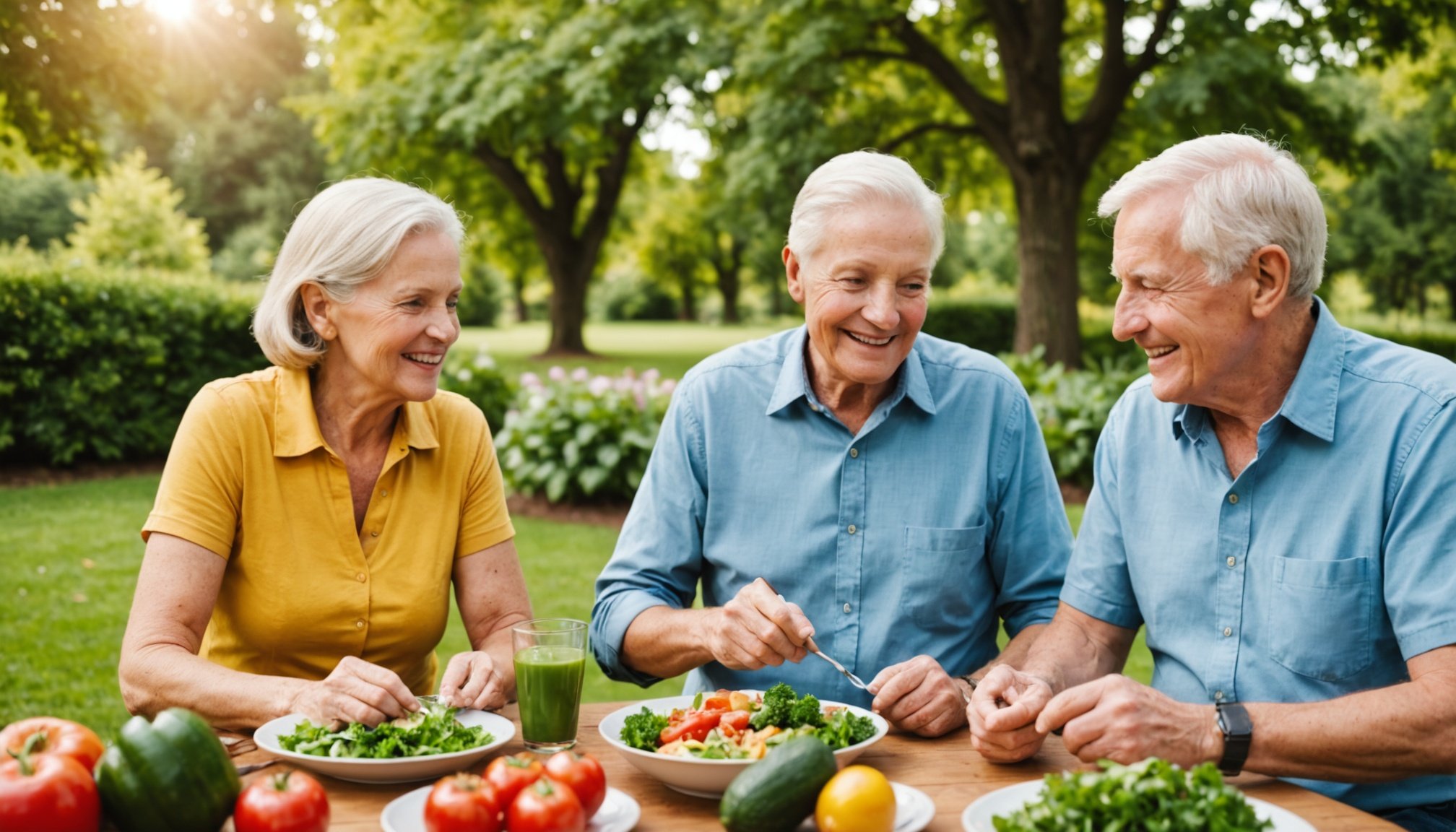Nutritional Requirements for Seniors Transitioning to Veganism
Understanding the nutritional needs of seniors is crucial when transitioning to a vegan lifestyle. Protein sources play a pivotal role in maintaining muscle mass and overall health. Seniors can explore plant-based proteins such as beans, lentils, and tofu to meet these needs effectively.
Attention should also be given to essential vitamins and minerals critical for senior health. Vitamin B12, often lacking in a vegan diet, is vital for nerve function and red blood cell formation. Fortified foods and supplements can help maintain adequate levels. Moreover, calcium is necessary for bone health and can be sourced from fortified plant milks and green leafy vegetables. Iron, crucial for preventing anemia, can be found in legumes, nuts, and seeds.
Also to read : Transforming senior safety: the essential guide to selecting footwear that minimizes fall risks
To meet daily nutritional needs, seniors should focus on variety. Incorporating diverse fruits, vegetables, grains, and legumes ensures balanced nutrient intake. Meal planning and portion control are valuable strategies to ensure nutritional adequacy.
Monitoring dietary intake, staying informed about vegan diet essentials, and seeking guidance from healthcare professionals or dietitians knowledgeable about veganism can provide additional support, ensuring a healthy and smooth transition for seniors embracing this diet.
In the same genre : Must-have mobility scooter attributes for seniors: key features to enhance your freedom
Health Benefits of a Vegan Lifestyle for Seniors
Adopting a vegan lifestyle offers numerous benefits for seniors, particularly regarding chronic disease prevention. Plant-based diets are rich in nutrients that can help manage conditions such as heart disease and high blood pressure. Research shows that vegan health benefits include improved heart health due to lower cholesterol levels.
Plant-based nutrition is also effective in managing many chronic diseases. Diets rich in fruits, vegetables, whole grains, and legumes provide antioxidants and fibers that support overall wellness. These components play an essential role in reducing inflammation, which is a significant factor in various age-related conditions.
In addition, seniors adopting a vegan lifestyle might notice improvements in weight management. A balanced vegan diet can lead to lower calorie consumption, supporting a healthy weight and increasing energy levels. This change is often accompanied by improved digestion due to the high fiber content of plant-based foods.
In summary, shifting to a vegan lifestyle can positively impact heart health and help seniors maintain their energy levels, manage weight, and enjoy enhanced overall well-being through improved blood pressure and reduced risk of chronic diseases.
Challenges Faced by Seniors in Adopting a Vegan Diet
Transitioning to a vegan diet presents unique challenges for seniors. One common barrier is the dietary restrictions that can arise from pre-existing health conditions. These conditions may require special attention to certain nutrients that are less prevalent in a vegan diet. Investing time in education around plant-based alternatives can ease this process.
Food texture and taste preferences also play a critical role when seniors adjust their eating habits. Comfort with familiar textures and flavours might make the transition daunting. It’s helpful to identify similar plant-based alternatives that satisfy these preferences, such as using tofu or tempeh to replicate meat textures.
Another significant challenge is ensuring that seniors meet essential dietary needs while maintaining adequate nutrition. Overcoming these hurdles requires careful planning of meals that are both nutritious and enjoyable to consume. Consider incorporating everything from legumes to a variety of vegetables to fulfil nutritional requirements while keeping meals appealing.
Lastly, social and familial dynamics can influence a senior’s willingness to adjust their diet, stressing the importance of a supportive environment that encourages exploring new foods and recipes tailored to their needs.
Meal Planning Tips for Seniors
Transitioning to a plant-based diet requires thoughtful meal planning to ensure nutritional adequacy and variety. Emphasizing meal prep strategies is crucial for seniors adapting to new dietary patterns. Prioritize simple and nutritious recipes that are both senior-friendly and easy to prepare. Start with meals that incorporate familiar ingredients, gradually introducing more diverse options.
For a seamless transition, establish a routine that includes preparing meals ahead of time, which can alleviate daily cooking demands. When choosing recipes, opt for those that meet essential nutritional needs by including protein-rich foods like tofu, beans, and lentils. Additionally, balance meals with an array of colourful vegetables to meet required vitamin and mineral quotas.
- Quick and nutritious recipes: Consider breakfast options like overnight oats topped with fruits and nuts. For lunch or dinner, try a hearty lentil soup or a chickpea salad.
Ensuring variety and balance in meals helps prevent dietary monotony and supports overall health. Adopting a gradual approach, where meals include a mix of grains, fruits, nuts, and seeds, can enhance both the culinary experience and nutritional benefits. Encourage trying new combinations and flavours to keep the menu exciting while meeting dietary needs effectively.
Resources for Support and Further Information
When transitioning to a vegan lifestyle, seniors can greatly benefit from vegan resources tailored to their needs. Nutrition education is essential, and several books and websites offer comprehensive insights into plant-based nutrition. These resources provide guidance on ensuring a balanced diet with all necessary nutrients, addressing typical challenges faced by seniors.
Support networks play a crucial role in this dietary transition. Local support groups and online communities offer a space to share experiences, recipes, and advice. They create a nurturing environment for seniors to exchange ideas and encourage each other. For example, senior centers and community groups often organize workshops focusing on plant-based eating, which can be highly educational and supportive.
Seeking professional guidance can further enhance the transition. Dietitians specialized in vegan diets for seniors offer personalized advice, helping to create meal plans that meet individual dietary needs while maintaining senior health. They can offer targeted recommendations on how to integrate essential nutrients like B12 and calcium, while also considering any dietary restrictions seniors might have. This professional support ensures seniors have a well-rounded approach to maintaining their health while embracing veganism.

